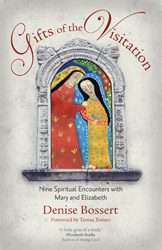Three Wise Women
Matthew Luke 1:26-56 and Luke 2:36-40
It goes without saying that women’s voices and experiences are often neglected, or minimized, culturally, politically, economically, and socially. I might add religiously as well: although there are some exceptions among indigenous spiritualities, virtually every religious tradition privileges the voices of men, and virtually all global religions bear the stamp of male leadership – Moses, Mohommed, Confucius, Gautama, Lao Tzu, the Vedic sages of Hinduism, and also Jesus. Some traditions, even within Christianity, prohibit women from spiritual leadership. Men certainly experience the Holy, and that is a good thing, but as a Chinese saying goes, “women hold up half of the sky,” and that includes the world of spirituality, prophetic faith, and congregational leadership.
Women at Center Stage
When we look at the Christmas stories, women are at center stage. They receive angelic visitations, unexpected and providential pregnancies, and encounter God’s Chosen Messiah. They receive divine inspiration and share divine revelation. Women speak, while their male companions are silent.
Two weeks ago, I invoked Mary Oliver’s poetic counsel, “Pay attention, be astonished, tell about it,” as descriptive of the spirituality of the Apostle Paul and John the Baptist, who challenged their communities to wake up to God’s presence and prepare to be part of God’s revelation in the world.
Today, I want to reflect on Three Wise Women, Mary of Nazareth, Elizabeth the mother of John the Baptist, and Anna the visionary prophet, each of whom encounters God as the beginning and the not the end of their spiritual journeys. For each one, mysticism leads to mission and astonishment leads to action.
Our Sister Mary
While the biblical story of Mary of Nazareth’s encounter with the angel Gabriel involves an obstetric revelation, the importance of the story is not the Virgin Birth, but Mary’s OPENNESS to God’s call to adventure. A teenage peasant girl, an unexpected agent of her own destiny, Mary paid attention!
Imagine a young woman, recently engaged, probably about sixteen years old, being singled out by the Holy One of Israel to bear the Hoped For Messiah. Living in an oppressed land, in which families typically had several children, Mary was just an ordinary teenager to the untrained eye. Indeed, Mary is, as one theologian stated, our sister and not physiologically, ethically, or experientially unique. Subject to birth and death, imperfect like the rest of us, and experiencing intimacy with her husband (after all, Mary and Joseph had several children, according to scripture), Mary is an inspiration and not an alien.
Mary is one of us. She is a daughter or granddaughter or younger friend preparing for her wedding day. She is a high school student, admiring good-looking boys at school, and hoping one of them will notice her. She probably challenged her parents from time to time like every teenager and dreamed of a better world than living under the thumb of the Romans and the domination of males, a world in which she could be an agent of her destiny, her people had political freedom, and every family enough to eat.
What is unique about Mary is not her sinlessness or God’s obstetric intervention. Later, scriptures suggests that Mary, like parents everywhere, found her son Jesus a mystery, a source of anxiety, and questioned his vocational judgment.
What is unique about Mary is that she said “yes” to an impossible possibility that would put her life and reputation at risk. Amazed and perplexed, she PAID ATTENTION AND WAS OPEN to follow God’s call to adventure. She was open to giving birth to divinity.
We don’t know whether Gabriel visited other households and offered God’s call to discipleship to other young women. But Mary was the first to say “yes.” On her “yes,” the world depends. Her “yes” and our “yes” can open the door to God’s birth in our families, neighborhoods, nation, and the world.
Elizabeth the Mentor
Like Mary, Elizabeth has an unexpected pregnancy that inspires her to PRAISE and ASTONISHMENT. Well beyond childbearing age, Elizabeth conceives along with her incredulous husband Zechariah a child who grows up to be John the Baptist. Elizabeth the elder becomes Mary’s mentor as Mary prepares to be the mother of God’s Messiah.
Think a moment: for the parents in this room, who was the first person you told of your pregnancy or the successful application for adoption – a parent or grandparent, a sibling, your best friend, a wise counselor? For Mary, it was Elizabeth. Mary’s pregnancy put her at risk of social ostracism and perhaps death in a patriarchal society, and she needed to confide in someone safe whose support she could depend on, someone who would stand with her – and protect her – regardless of the consequences.
When Mary and Elizabeth greet one another, Elizabeth’s child leaps in her womb. Revelation can come to anyone: even fetuses, children, undocumented immigrants, and our companion animals. Amazed by this pre-natal revelation, Elizabeth breaks out in song. She is, as Mary Oliver notes, ASTONISHED and astonishment inspires praise.
In the spirit of William Blake, her doors of perception are cleansed, and Elizabeth sees the world as it is – infinite, wonderful, amazing, and beautiful even in its tragedy and disappointment. She sees God’s revelation embodied in the fetus John just entering the third trimester.
It has been said that the modern world suffers from ecstasy deficiency, the inability to be astonished, filled with awe, and inspired by beauty. In our quest to control the world, we have lost a sense of wonder. But, as Fyodor Dostoevsky asserts, the world is saved by beauty. In her ecstasy, Elizabeth sees infinity in a fetus and holiness in a pregnant teenage relative. For three months, Elizabeth provided Mary with a home. In my imagination, I see her interceding on Mary’s behalf with Mary’s parents and possibly reaching out to Joseph, protecting Mary from the threat of dishonor or death. I see her as teaching Mary how to navigate the complexity of her future vocation as Jesus’ mother.
“Pay attention” – listen to your life and awaken to the world. Be woke to wonder, and astonishment.
Anna the Prophet
Then, as the poet says, tell about your astonishment, let your life speak. Mary sings praises to the God who brings justice to the world and Anna is the first evangelist of the Jesus movement. An elder, a widow, no doubt seen as eccentric because of her spending every day in the Temple, Anna lived in expectation of God’s revelation. Most of her eighty-four years, Anna, woke up every morning with the question: Would this be the day she would experience God’s future? Would now be the time that my life’s quest would be fulfilled?
Anna peered expectantly at every child entering the temple for the ritual of their child’s dedication to God. And then a working-class family, nothing special in terms of appearance or pedigree shows up, and the heavens open, and Anna sees into infinity and beyond. Of the hundreds in the temple that day, only Anna and Simeon recognize the Messiah. They prepared for a vision and when the moment is right, they see what others miss – God in their midst, God’s revelation in the form of a baby.
For Simeon, another elder who has been waiting for decades, the journey ends with encountering the Christ Child. For Anna, the journey is just beginning. She TELLS ABOUT IT. She lets her life speak and gives voice to God’s revelation to a chaotic and confusing world and a people beaten down by oppression.
Today, these Three Wise Women awaken us to our role in the Christmas story. We can give birth to God’s presence in the world and become messengers of God’s world of peace and Shalom. We can dream of turning the world upside down as Mary does in her hymn of restless praise, the Magnificat. In the busyness of holiday preparation, these three wise women remind us that we are always on Holy Ground and that God’s invitation comes moment by moment and act by act. There are angelic messengers and fetuses leaping with praise everywhere. There is beauty everywhere, awaiting our noticing and ready to deliver us from our hopelessness and anxiety. And, inspiring us to find our voice. To share good news, to be good news incarnate, to let our light shine, and go tell it on the mountain – that God is love, that the world can be a place of compassion, and our church can be a sanctuary of hope for the lost, lonely, persecuted, and at risk.
At Christmas, we have received our vocation to live out in our own unique ways, following the path of three wise women: PAY ATTENTION. BE ASTONISHED. TELL ABOUT IT. Joy to the World the Lord has come, let earth embrace God’s Love.
+++
Bruce Epperly is Theologian in Residence at Westmoreland Congregational United Church of Christ, Bethesda, MD, and a professor at Wesley Theological Seminary. He is the author of over 80 books, including his six 12 Days of Christmas devotional books, “Saving Progressive Christianity to Save the Planet,” “Homegrown Mystics: Restoring the Soul of the Nation with the Healing Wisdom of America’s Visionaries,” and “Jesus: Mystic, Healer, and Prophet.” He may be contacted at www.drbruceepperly.com












